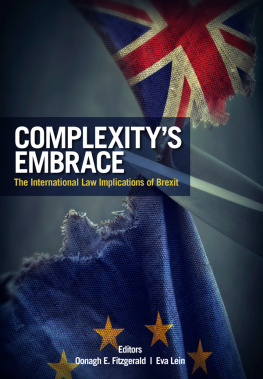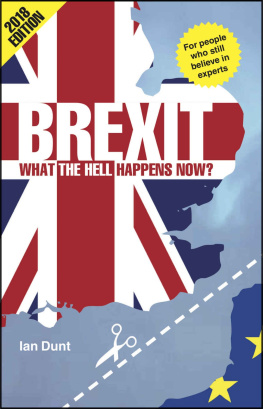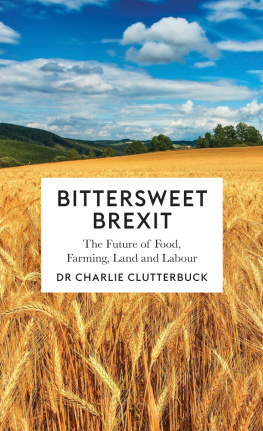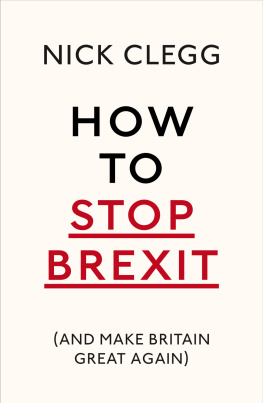
Sir Anton Muscatelli
Economist and Chairman of the Russel Group of Universities which includes University College London, the London School of Economics and Oxford and Cambridge Universities.
Government would be guilty of a serious dereliction of duty to leave the single market and the customs union. It would be the most unhinged example of national self-sabotage in living memory
Dr Robert Clark Majerus
Historian, economist, author of historical works and Chairman of The Literary Encyclopaedia
Wide ranging and blessedly succinct, Felber punctures many of the myths of Brexit to devastating effect
John Fairly
Co-founder and retired Chief Executive of Yorkshire Television.
It is a work of real importance not only for the power and weight of argument but also for the clarity with which it is expressed. The whole effect is truly authoritative, for in this whole fearful argument I have not seen anything like it
Emily Thornberry
MP and the Labour Partys Shadow First Secretary of State.
A well-researched, detailed and politically poignant piece of work
Silas Bown
Financial journalist: Euromoney
Felber writes a book that follows the facts gripping, startling and often infuriating you; but ultimately you are left with a glum regret that more of Brexit didnt follow the facts too
ABOUT THE AUTHOR
From 1970 to 2016 Roger Felber was a founder or shareholder in a number of companies in the money market. Firstly Anthony Mack, which became part of TP ICAP, now one of the largest currency brokers in the world and, from 2004 to 2016, the Latin America regional Brokerage for London listed CMC PLC.
He has been the owner or part-owner of a number of engineering and media companies and during the 1970s and 1980s ran the airline Air Florida as well as chairing the London listed Parkfield Group PLC. In the 1990s and 2000s he partnered with Private Equity companies 3is and Dresdner Kleinwort Benson. In 2008 he led the purchase of British Path from the Daily Mail Group, taking over as CEO. He retired in 2017.
CONTENTS
INTRODUCTION
Theresa May appointed David Davis effective July 2016 as the UKs Minister in charge of exiting the EU. He was the person who in Mays judgement was the most able person to carry out this essential job. It was his first Ministerial post.
I will quote verbatim the words of Davis May 2016, two months before his appointment in July 2016. He held this position until he resigned two years later:
So be under no doubt: we can do deals with our trading partners, and we can do them quickly. I would expect the new Prime Minister on September 9 th (2016) to immediately trigger a large round of global trade deals with all our most favoured trade partners. I would expect that the negotiation phase of most of them to be concluded within between 12 and 24 months .
These 24 months expired without a single trade deal being concluded and no discussions of significance had started. Therefore, Davis plan was a complete failure.
And this was as much Mays failure as Davis because she agreed with Davis madly optimistic proclamation in May 2016 without herself having consulted with experts. Experts would have told her what Davis was saying was impossible to achieve. And May knew Davis was not an expert on such matters.
Even more worrying was that she left him in this key Ministerial position, not achieving any of his objectives, for a full two years. Then he resigned.
We were supposed to be preparing to leave the EU for three reasons. Firstly, to do our own trade deals around the world. However, we already have them under our EU umbrella, around 100, including 27 with the other EU countries; and in all the circa 100 representing deals with nations representing 65% of the worlds GDP. Government did not tell us this!
Secondly there was the wish to have less immigrants. However, almost two thirds of immigrants come from outside the EU, and it is up to us whether or not we accept them. We dont need to quit the EU to reduce immigration. Government did not tell us this!
And thirdly there is the matter of Parliamentary Sovereignty. Around 90 percent of our laws originate in the UK and 10 percent in Europe. However, where our Parliamentary Sovereignty has been seriously diluted is by what is known as Secondary Legislation, which are laws which have the same authority as laws which pass through Parliament; but they do not go through the Parliamentary process as we all know it to be.
This Secondary Legislation takes place in England, not in the EU and represents 88% percent of all laws and 90% of laws made in the UK; with no Parliamentary scrutiny. Government did not tell us this!
We should and can do something about this which I discuss in Chapter 5. However, this deficiency in our law-making system has nothing to do with the EU and would be unaffected by any version of Brexit.
In the past half century, only in very badly run and misguided dictatorships have matters been allowed to get so bad and as quickly as I envisage would happen for Britain outside the EU.
CHAPTER 1
A VISION OF BRITAIN OUTSIDE THE EU
Outside the EU without remaining part of the Single Market and The Customs Union, Britain would very soon be importing all cars and exporting none. This is because within 2 to 4 years car manufacturers in the UK, which are exclusively foreign owned, will have shut their UK plants.
Britain will remain an important but shrinking market for cars and we will mostly be buying the cheaper models. Government will have to charge import duty on new cars. Excluding housing, cars are in general the largest value items people purchase. Annually 2.5 million new cars are presently sold in the UK at an average price to the dealers of around 16,000. At current volumes and prices this would represent 40bn of imports on which the World Trade Organisation WTO tariff would be charged.
This tariff would not deter people from buying cars, although it will make them more expensive. This will result in the life of a car on the UK roads becoming longer, so reducing the extent that the extra cost eats into family essentials.
Our roads will start to look shabbier with more cheap models and older cars, as will many other things in our beautiful country. Currently the average life of a car in the UK is around 9 years, and in the future, outside the EU, an average life of 14 or 15 years is likely, similar to Greece and Portugal today. This will in part be because of customs duty on each new car, but mostly because of a national fall in disposable incomes in the UK post Brexit.
Older cars on the road will be one of the earlier visible signs of Britain ceasing to be a rich country, to be followed by many other visual reminders in surprisingly short order.
Once outside the EU our other manufactured products will be less competitive in foreign markets because of our smaller scale of manufacturing. This will be largely because of our loss of free trade deals with the EU and with other nations under the EU umbrella, around 100 countries in all.
There may be some small relief for exporters from a tumbling pound and falling wages as unemployment rises. However, these items would be more than negated with the weak pound causing imported raw materials, especially oil and plastics to be more expensive.
Anyway, if you exclude the motor industry which would quickly disappear, as is also likely for aerospace, our manufacturing industries will not be worth more than 100bn to 150bn per annum so around 2,000 per annum per capita. This is much too small for a highly populated and developed country which needs manufacturing as part of its economy. It is around the same per capita manufacturing output as Portugal which is not perceived as a manufacturing nation.
Next page














